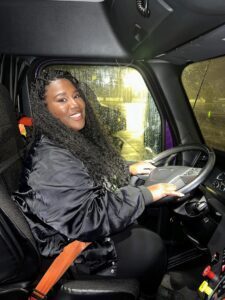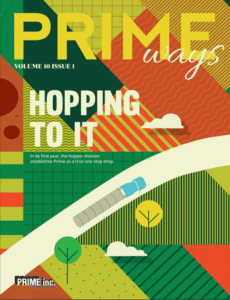
Q: Did you come through our training program here at Prime Inc and how was your experience?
A: I came through as a PSD five years ago. I had a great training experience. I took the information that I received from my trainer and made it my own.
Q: What made you decide to become a trainer?
A: Well, I was happy with the money that I was making, but after speaking with my fleet manager and looking into the numbers, I couldn’t believe I could earn that. So, I decided to give it a try to see whether I liked it.
Q: Were you able to see the numbers he was talking about?
A: I did, yes.
Q: How long have you been training?
A: About 2 years. I really feel like I’m preparing people for life on the road.
Q: In your opinion, what makes a good and coachable student?
A: One who pays attention and who asks questions. The student and the trainer must be respectful.
Q: What do you think are the key components to becoming an effective trainer?
A: You must be understanding that everybody doesn’t learn the same way. You also need to be organized and willing to help people to be effective. That’s the main thing. I feel good when I can teach my students something, and they can go out in the world with that.
Q: What type of questions do you ask your students to get to know them, and their motivation for being here at Prime Inc?
A: One of the first questions I ask is “why did you come here?” Especially with social media, they can get all kinds of perspectives in their head. Some have all these expectations. I try to figure out where they came from and what are their goals in the trucking industry.
Q: What are some of the strategies that you put in place to help your students succeed?
A: I like to give them a routine and a schedule. I also try to be attentive and give them a flow, so they understand what a productive day looks like. My students learn what they need to do before can roll so, that when we are rolling, they can be attentive. And when we are stopped to make the most of their time.
Q: Do you think it’s important for a trainer to get to know their individual students? If so, why is that important?
A: Yes because everybody doesn’t learn the same. Certain things may affect them in a certain way, compared to another individual. I ask questions like, “how do you respond to certain situations?” That helps me out as a trainer getting that feedback.
Q: How do you handle conflict resolution to keep your students focused and engaged?
A: Since the beginning, I made it a point to avoid having conflict. I remember being a student. So, in the beginning I am already aware of the process. I let them know that I’m the trainer and here to help them. I explain that whatever I ask them to do, it’s for their benefit as a student and as a future driver. My role is to guide them through their success as they put in the work.
Q: Are you approachable and transparent with your students?
A: Yes, I am approachable. I let them know that they can come to me at any time. I try to make it clear that I am here to answer any concerns they may have.
Q: Would you say that coaching skills are necessary when working with your students?
A: You do have to sometimes assist people with things outside of trucking. I feel like for me it’s being motherly. If the student is a male, it’s more like coaching. I use my motherly instincts with the way I train.
Final thoughts:
This work can be very rewarding in different aspects. It’s rewarding to see your students go on with their trucking careers and be successful at it. The financial aspects can also be rewarding. That said, I love training.












